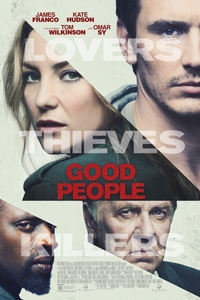Good People (2014) (R) ★★½
 Although a serviceable thriller, Good People suffers from the disconnect that exists between its narrative structure and its pacing/tone. The "feel" desired by director Henrik Ruben Genz (making his first English-language feature after compiling an impressive filmography in his native Denmark) is that of a slow-burn neo-noir effort but the screenplay barrels ruthlessly forward, eschewing the kinds of detail and background that would make this a fuller, more rewarding experience. Despite attempts to explore the inner lives and desires of the two protagonists ("sushi nights", her obsessive desire to have a child, etc.), the characters never fully emerge and underdeveloped (borderline incoherent) subplots involving rival crime gangs and police corruption become background noise at best and distractions at worst. There's probably enough content here to warrant a three-hour movie but Good People is only 90 minutes long.
Although a serviceable thriller, Good People suffers from the disconnect that exists between its narrative structure and its pacing/tone. The "feel" desired by director Henrik Ruben Genz (making his first English-language feature after compiling an impressive filmography in his native Denmark) is that of a slow-burn neo-noir effort but the screenplay barrels ruthlessly forward, eschewing the kinds of detail and background that would make this a fuller, more rewarding experience. Despite attempts to explore the inner lives and desires of the two protagonists ("sushi nights", her obsessive desire to have a child, etc.), the characters never fully emerge and underdeveloped (borderline incoherent) subplots involving rival crime gangs and police corruption become background noise at best and distractions at worst. There's probably enough content here to warrant a three-hour movie but Good People is only 90 minutes long.
James Franco and Kate Hudson play Tom and Anna Wright, an American couple who have moved to England in search of a fresh start following a miscarriage. She teaches school and he is renovating an old house. Financially, they are in dire straits and, when their downstairs tenant dies of a drug overdose, the bag of money (in excess of 200,000 pounds) they find stashed above the ceiling tiles is like manna from heaven. After (briefly) agonizing over the morality of using it, they judiciously dip into their newfound funds to clear some debts. That's when Detective Inspector John Halden (Tom Wilkinson) arrives on their doorstep. He believes the Wrights' dead renter was connected to a brutal criminal, Jack Witkowski (Sam Spruell), and suspects there may be drugs and missing money involved. Shortly thereafter, Witkowski arrives and, certain that the Wrights know something about "his" cash, he doesn't ask many questions before starting the torture.
Good People begins with a series of perfunctory scenes that introduce the characters without effectively establishing them as three-dimensional. The inhabitants of the film are neatly divided into two groups: the good people (hence the title, which is not intended to be ironic) and the bad ones. The early action, which involves Witkowski breaking into the Wrights' house and doing some rather nasty things to Tom and Anna, starts too soon and ramps up too quickly. Home invasion stories work best when there's build-up and tension. In Good People, perhaps because the filmmakers worry that viewers will lose interest if they don't get to the violence without delay, elements that generate suspense are downplayed in order for the story to hurry to the maiming, bleeding, and bludgeoning. From there, the film turns into a cat-and-mouse game with the Wrights using the money as their leverage in an attempt to stay alive. Halden's involvement is by turns confusing, convenient, and irrelevant.
The movie ends with an entertainingly bloody finale in which all the characters, representing four distinct sides (innocents, criminal group #1, criminal group #2, and police), come together in a dilapidated house and attack each other with whatever implements are at hand. The nail gun is an especially nasty implement for bloodletting. There are some surprises during this segment. It represents Good People's biggest action scene and is handled with skill (and even occasional flashes of dark humor) by Genz, who cuts back and forth to show each character's circumstances and progression. The effectiveness of this approach, however, is diluted by the protagonists' poor definition. Had a firmer bond been forged with them, Good People's climax would have been stronger. As entertaining as this sequence is, it doesn't obfuscate the film's flaws or scrub away the sense that it's too generic in what it achieves. Good People provides the degree of entertainment one expects while sitting on a sofa watching a direct-to-video effort rather than the higher standards one sets for paying $10 for a movie ticket.
To get the full Quicklook Films experience, uncheck "Enable on this Site" from Adblock Plus
box office top 10

Civil War Released: April 12, 2024 Cast: Kirsten Dunst, Wagner Moura 25.7M

Godzilla x Kong: The New Empire Released: March 29, 2024 Cast: Rebecca Hall, Brian Tyree Henry 15.5M

Ghostbusters: Frozen Empire Released: March 22, 2024 Cast: Paul Rudd, Carrie Coon 5.8M

Kung Fu Panda 4 Released: March 8, 2024 Cast: Jack Black, Viola Davis 5.5M

Dune: Part Two Released: March 1, 2024 Cast: Timothée Chalamet, Rebecca Ferguson 4.3M

Monkey Man Released: April 5, 2024 Cast: Dev Patel, Sikandar Kher 4.1M

The First Omen Released: April 5, 2024 Cast: Nell Tiger Free, Bill Nighy 3.8M

The Long Game Released: April 12, 2024 Cast: Dennis Quaid, Gillian Vigman 1.4M

Shrek 2 Released: May 19, 2004 Cast: Mike Myers, Eddie Murphy 1.4M

Sting Released: April 12, 2024 Cast: Alyla Browne, Ryan Corr 1.2M






